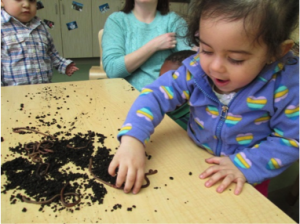This post was co-authored by Julia Dadds, director of Educare of Lincoln, one of 20 birth-to-five centers across the country. Dadd’s Educare was recently featured in Ready for Kindergarten: the Impact of Early Childhood Education, a film that explores the benefits of investing in early education for young children and their families through the perspectives of scholars, state policymakers, educators, and the parents and children themselves.
After 30 years of standards-and-accountability “reforms,” we are beginning, as a nation, to question whether the pendulum has swung too far, or even whether we’ve been swinging at the wrong thing. Over those same decades, however, evidence continues to affirm the wisdom of investing early in children’s lives. If we could somehow apply lessons we have learned in the birth-to-five arena to K-12 policy, we might attain the breakthroughs we have sought, so far largely in vain: boosting achievement, significantly narrowing race- and income-based achievement gaps, and preventing the “fade-out” that siphons off many of the benefits of great early experiences. Spoiler alert: worms play an important role.
At the same time, new data from high-quality state pre-K programs – Oklahoma’s universal pre-K, New Jersey’s Abbott program and Boston Public Schools’ pre-K – echo early benefits seen in “model” programs like Perry Preschool and Chicago Child-Parent Centers. Brain research tells us that early investment is better – quality experiences are most effective when babies are gaining 700 synapses per second. We also know more about which activities – stimulating and nurturing interactions with skilled adults, enriching, hands-on experiences that advance cognitive AND “non-cognitive skills” – drive those benefits.
What we have failed to do is put the pieces together. Birth-to-5 and K-12 policies are not just disjointed, but in many key respects, at odds with each other. Rigorous evidence abounds regarding the characteristics that inform early childhood teacher quality, evidence that is supported by everyday experiences of center directors, children and their parents. Great early educators have extensive knowledge about child development across age groups. They work to develop strong, nurturing relationships and deliver enriching, multi-faceted curriculum. At Educare, this is our highest priority, since such teachers deliver what our disadvantaged kids need. Yet, though our instincts (and research) tell us that these same qualities also make for stellar elementary school teachers, policymakers ignore it when evaluating them.
At the preschool level, we not only acknowledge the impediments to success posed by poverty, we work proactively to address them. Educare draws on decades of research to provide our most at-risk children with enriching experiences that lucky kids enjoy as a matter of course. Our state’s pre-K program targets low-income and non-English speaking children because we know how far behind they are when they begin kindergarten. Yet these same factors become “excuses” when those children turn five, and rather than providing teachers with the extra resources they need, we punish them. We begin to argue about whether all children do, in fact, need doctors, dentists, breakfast and one-on-one attention.
Finally, early educators make parents real partners; we know that, if classroom experiences do not translate at home, gains cannot be sustained. This means visiting parents at home, or in other places that are comfortable and convenient. It means providing meaningful and relevant ways for them to engage, and finding ways to bring home culture into our classrooms. It means talking to them about how their three-year-old came to love worms. Too often, however, partnerships disintegrate as schools perceive poor parents as more problem than solution, and pay little more than lip service to the issue, even as they bemoan parents’ lack of caring or devotion.
As we consider the future of education policy, I believe that bringing these lessons from pre-K classrooms to bear on K-12 policy would reap huge benefits. Evidence and common sense tell us how much we could boost achievement, improve schools and substantially narrow achievement gaps. We could not only staunch the outflow of early gains from our birth-to-5 investments, we would see them blossom and grow over time, benefiting not just children today, but for generations to come.




